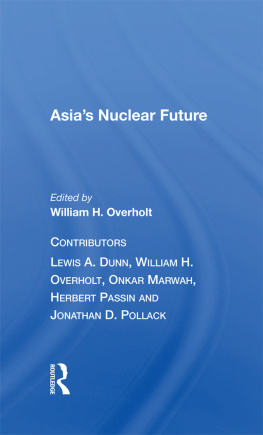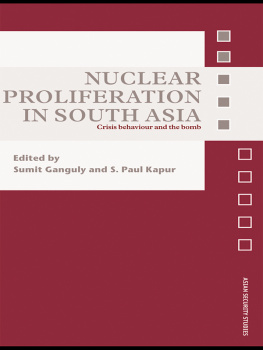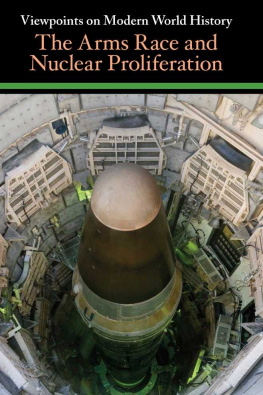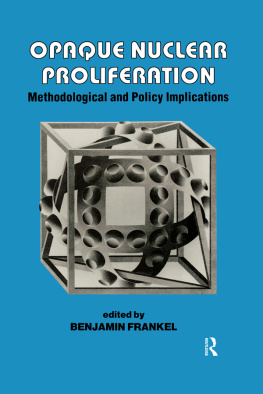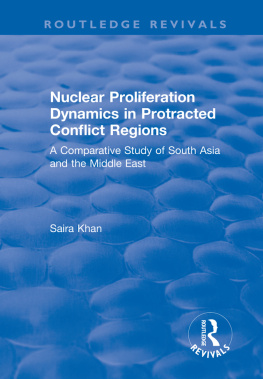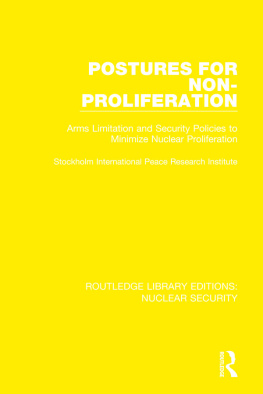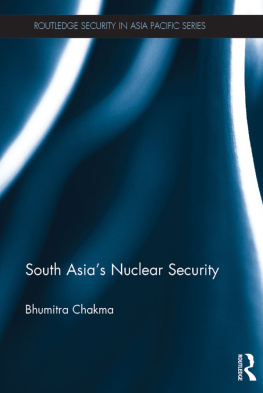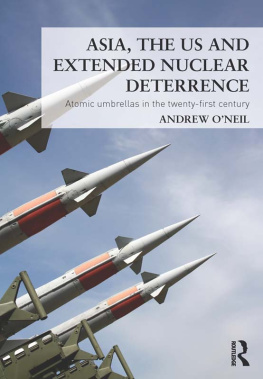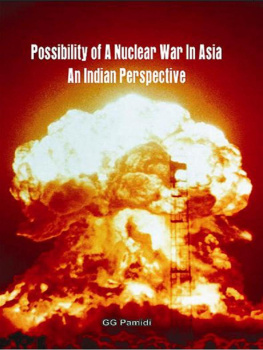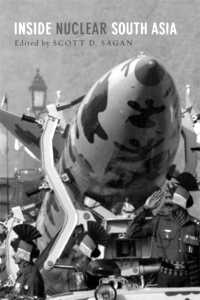Asia's Nuclear Future
Studies of the Research Institute on International Change, Columbia University
Zbigniew Brzezinski, series editor
Zbigniew Brzezinski is Herbert Lehman Professor of Government and director of the Research Institute on International Change at Columbia University, where he has taught since 1960. Dr. Brzezinski serves also in the Carter administration as assistant to the president for national security affairs.
Other Titles in This Series
Radicalism in the Contemporary Age, Volume 1
Sources of Contemporary Radicalism
Seweryn Bialer and Sophia Sluzar, editors
Radicalism in the Contemporary Age, Volume 2
Radical Visions of the Future
Seweryn Bialer and Sophia Sluzar, editors
Radicalism in the Contemporary Age, Volume 3
Strategies and Impact of Contemporary Radicalism
Seweryn Bialer and Sophia Sluzar, editors
The Relevance of Liberalism
Staff of the Research Institute on International Change, editors
Asias Nuclear Future
William H. Overholt, editor
Future historians are very likely to see nuclear proliferationor the averting of nuclear proliferationas one of the central determinants of international politics in the last quarter of the twentieth century. Certainly the development of an independent nuclear deterrent by the People's Republic of China and the possibility that Taiwan, Korea, Japan, India, and Pakistan might become powerful actors on the nuclear stage have become a serious concern. Asian powers play a crucial role in the nuclear future of the planetChina because it is a superpower, India and Taiwan because they could so quickly trigger further proliferation, and Japan because a Japanese nuclear buildup would have awesome consequences for global power balances.
At the same time, many assumptions about nuclear proliferation and imbalance seem premature or false. In the case of China, for example, nuclear strength could be analyzed as a stabilizing factor, paralleling concrete progress toward stable relations with the United States and Japan.
In this book a number of specialists with a variety of academic backgrounds analyze the nuclear future of Asia. Although they are agreed on the importance of their topic, the authors' interpretations of events and dynamics do not always coincide. Their differences of opinion will encourage readers to broaden their understandings and draw their own conclusions.
William H. Overholt has served on the Hudson Institute research staff since 1971 as a policy analyst specializing in foreign policy, Asian politics, and policy development. He is also a research associate at Columbia University's Research Institute on International Change.
Asias Nuclear Future
William H. Overholt, editor
Contributors
Lewis A. Dunn William H. Overholt Onkar Marwah Herbert Passin Jonathan D. Pollack
First published 1977 by Westview Press, Inc.
Published 2019 by Routledge
52 Vanderbilt Avenue, New York, NY 10017
2 Park Square, Milton Park, Abingdon, Oxon OX14 4RN
Routledge is an imprint of the Taylor & Francis Group, an informa business
Copyright 1977 Taylor & Francis
All rights reserved. No part of this book may be reprinted or reproduced or utilised in any form or by any electronic, mechanical, or other means, now known or hereafter invented, including photocopying and recording, or in any information storage or retrieval system, without permission in writing from the publishers.
Notice: Product or corporate names may be trademarks or registered trademarks, and are used only for identification and explanation without intent to infringe.
Library of Congress Cataloging in Publication Data
Main entry under title:
Asias nuclear future.
(Studies of the Research Institute on International Change,
Columbia University)
1. AsiaPolitics and government. 2. Atomic weapons. 3. Asia
Defenses. I. Overholt, William H. II. Series: Columbia University.
Research Institute on International Change. Studies of the Research
Institute on International Change, Columbia University.
DS35.A87 327.174095 77-778
ISBN 13: 978-0-367-01793-4 (hbk)
To my parents
Contents
William H. Overholt
Lewis A. Dunn and William H. Overholt
Jonathan D. Pollack
Herbert Passin
William H. Overholt
Onkar Marwah
Lewis A. Dunn
William H. Overholt
Future historians are very likely to see nuclear proliferation, or the averting of nuclear proliferation, as one of the central determinants of international politics in the last quarter of the twentieth centuryand perhaps for many generations thereafter. In the late 1970s the possibility that Taiwan, Korea, Japan, India, Pakistan, Iran, Israel, Egypt, South Africa, Brazil, Argentina, and others might rather quickly become nuclear powers has suddenly become a serious concern. Asian powers play a crucial role in the nuclear future of the planet, India and Taiwan because they could so quickly trigger further proliferation, and Japan because a Japanese nuclear buildup would have such awesome consequences for global power balances.
To analyze the nuclear future of Asia, I have turned to specialists with a variety of academic backgrounds: two political scientists, a sociologist, and two specialists in the interaction between science and international affairs. Although they bring to the subject of nuclear proliferation different academic specialties and different political perspectives, they share a disregard for conventional boundaries between disciplines and for the emphasis on method over substance which have tended to fragment knowledge into ever-smaller and ever-more-irrelevant fragments. The first paper is methodological, the last is a policy analysis, and the remainder are substantive analyses of particular situations.
Nuclear proliferation is a secretive and controversial subject, one which does not lend itself to consensus. Although Lewis Dunn and I have indicated in the first chapter the directions in which we believe nuclear proliferation research should move, and although I have organized the volume according to this view, I have made no attempt to achieve consensus as to either substance or method. On the contrary, I have sought to provide sufficient controversies to allow the reader to draw his own conclusions.
Differences of opinion pervade the volume. Lewis Dunn and Onkar Marwah have entirely different perspectives on Indian nuclear programs. Herbert Passin and I disagree not only over the quotations he cites from my article as dangerous opinions, but also over the likelihood that the Soviet Union would preemptively attack a Japanese nuclear program, the likelihood that the United States would withdraw from Europe and thereby stimulate German nuclear programs, and the likelihood that Japanese nuclear technology could catch up with the superpowers. These differences on specific issues may reflect deeper differences in our assumptions about such fundamental issues as the extent to which one can depend upon the ability of governments to make rational choices, and the relative influence of domestic and international environments on policies. Such differences notwithstanding, I regard Herbert Passin's article as a classic contribution to nuclear proliferation studies and in many ways the centerpiece of this volume. The other controversies are included in the same spirit.


